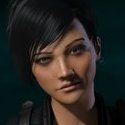Some good principles for designing any story:
Aristotelian Unity - Do not put redundancy in your design. Never use a bigger setting or longer amount of time than necessary. Never have two characters or objects that serve the same purpose. Smaller settings and more compact timelines make for a more intense story, and unique characers and objects which serve multiple functions are more interesting and memorable.
Main Character/Impact Character Complementarity - Most stories will have a main character and another character who has the most impact on the first character because the two characters have either opposite goals, or opposite methods for trying to achieve the same goal. In any story one of these characters should be forced by the plot to change their goal/approch, while the other character remains steadfast in their goal/approach. This is how you as a writer present a moral about what people should do or how they should do it to your audience. The character who changes does not necessarily have to be changing from the 'wrong way' to the 'right way'; a story with an unhappy ending suggests that the steadfast character was wrong and too stubborn or blind to change, and the dynamic character got dragged down too by not being strong-willed or faithful enough.
For Every Element, Include Its Opposite - If you want to talk about one character with a particular virtue/flaw/trait, you need to have another character with the opposite trait to contrast them with. If you want to show how a society is too ritualistic/individualistic/frivolous/stodgy/whatever, you need to show either a misfit individual or group within that society, or an alternate society, which has the opposite trait. Plot events too should generally be symmetrical or circular: a 'leaving home' scene somewhere in the story suggests a 'coming home' scene elsewhere, a fight scene is balanced by a brooding scene, a clever plan by its accidental mis-execution, a mystery by its solution, etc.
Register: Consistency and Variation - Your register (word choice) and tone should be consistent throughout a story and for each character, but each character's way of speaking should be different from the other characters' and the narrator's.
Control Focus With Detail vs. Ambiguity - Some of us prefer a lot of detail, some of us very little; nevertheless, you need to use both in your writing to direct your audience's attention to the important elements of the story. If you make everything detailed your audience will be bored because you are not asking them to use their imaginations; if you make everything ambiguous your audience will be confused, which again leads to boredom because they have no foundation on which to base their imaginative guesswork. Either make the setting ambiguous and the main character and plot clearly detailed, or make the setting detailed and the character motivations and plot ambiguous, and the audience's attention and suspense will be focused on figuring out what the detailed parts imply about the ambiguous parts.
[Edited by - sunandshadow on December 7, 2004 5:24:16 AM]
Really like this write-up. Good job.







